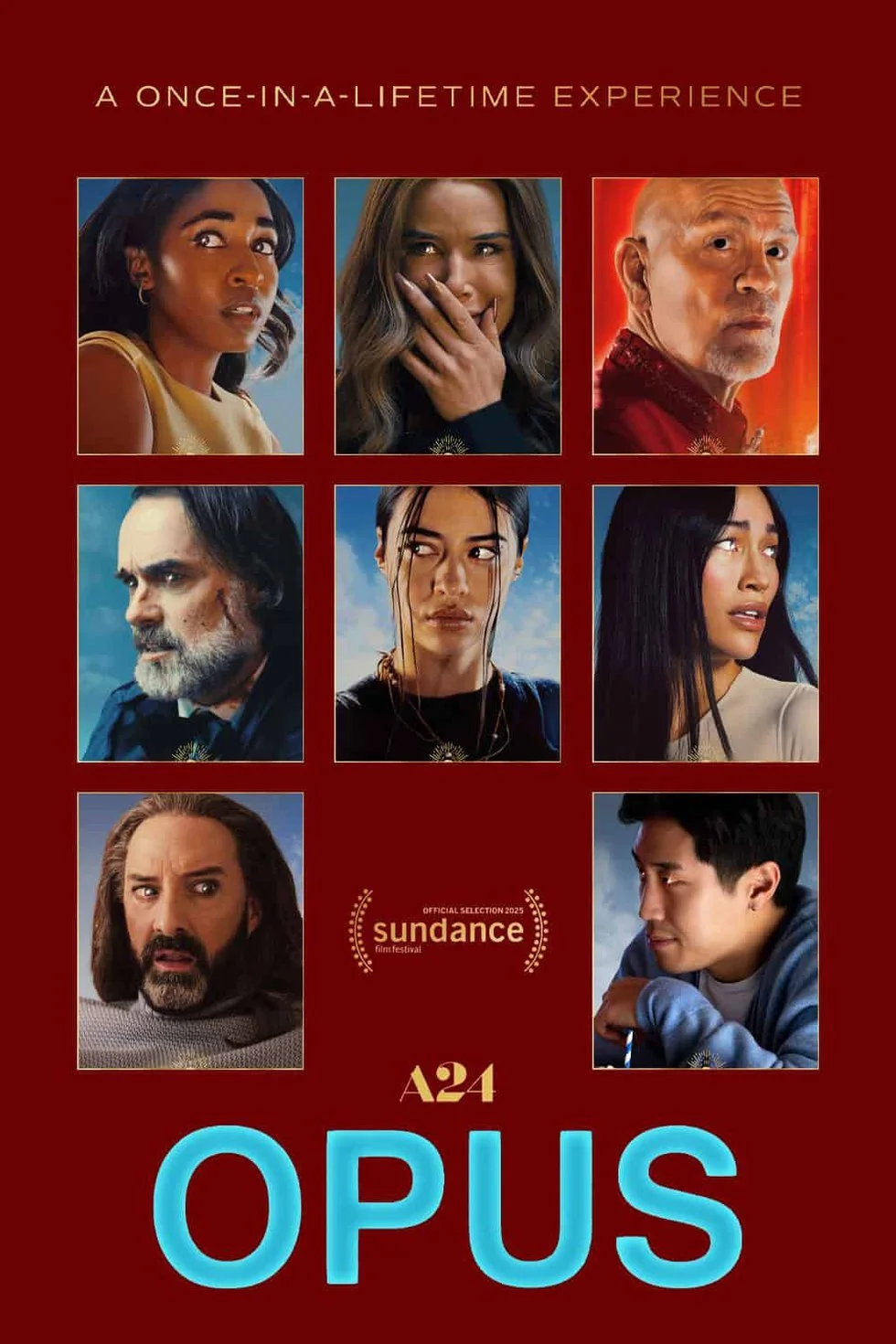Opus – Fame, Media, and Madness
In Opus, director Mark Anthony Green constructs a vivid, satirical nightmare where the price of fame is brutally dissected amidst chilling absurdity. Anchored by John Malkovich's flamboyant and mesmerizing portrayal of Alfred Moretti, a faded '90s pop legend obsessed with rekindling his cultural relevance. The film dances effortlessly between camp, horror, and unnerving spectacle. Critics and fans alike remain polarized, but few leave unaffected.
The setup is disarmingly straightforward: Moretti invites a group of journalists to his isolated desert estate for an exclusive listening party of his new album, Caesar’s Request. Among them is Ariel Ecton (Ayo Edebiri), a bright, ambitious journalist navigating a landscape riddled with ego and aesthetic manipulation
What unfolds is a descent into a hallucinatory cult-world where reality begins to mimic performance. Malkovich vacillates between charismatic ringmaster and quiet tyrant, and Edebiri’s Ariel becomes our emotional anchor, her journalistic compass increasingly tested by the surrealist grotesque she’s documenting.
Among the standout sequences is the “passing of the bread” scene, equal parts absurdist ritual and social satire, pulling laughter and discomfort in equal measure. In one unforgettable performance, Moretti dons a shimmering helmet, channeling a Daft Punk-esque persona while descending into an erratic, frenzied performance that blurs the line between genius and delusion. It's not just a show. It’s a declaration of vanity, chaos, and desperate relevance
Violence creeps in like a mirage. Mark Sivertsen’s Bill Lotto meets his end during a massage, right before the Moretti’s performance. The Levelist, appeared to be measuring him his back for a fitting, but in stead his scream of terror escape the walls of the compound, but still remained unheard by the rest of the guest.
Then comes the clam shell sequence, so matter-of-fact in its brutality that it haunts in a different register. A nameless man splits shells open with meditative precision, before stabbing himself cleanly in the web of his between his index and thumb, no scream, no wince; he just rips the knife right out of his hand wraps the area on a bit of cloth and continues his work breaking into clams for pearls.
Ariel’s isolation crescendos during a morning run. The camera lingers, slow and menacing, as one of the Levelists shadows her, inching closer. She doesn’t scream, she quickens. The silence carries weight; it’s the moment when journalism feels less like a profession and more like prey. Later when Ariel has finally had enough, she escapes her room through the window and goes searching for her phone in one of the buildings on the compound and while she manages to uncover a basket of Saran wrapped phone she’s unaware of Bill Lotto’s rotting corpse behind her.
The film has drawn mixed responses. Pitchfork criticizes it as “a fangless spoof of celebrity culture,” questioning its bite. The Guardian labeled it “a silly horror dud,” downplaying its stylistic intentions. But such takes may miss the point: Green’s film wants to feel theatrical. It isn’t realism, it’s allegory soaked in glitter and blood.
The final act tips into operatic madness. Moretti, revealed as willing to kill for a headline, loses any remaining veneer of artistry. It’s narcissism meets Machiavellian precision, fame as both weapon and mask.
The surreal crescendo of Opus arrives not in a grand musical performance, but a puppet show the "Billie puppet" made to represent Billie Holiday is used in a puppet show that forms part of a bizarre ritual led by the cult leader, Alfred Moretti. The puppet is harassed by reporters (represented by rat puppets) during the show, before quoting Julius Caesar’s revenge and then killing everyone.
My take; Moretti as a performer trapped in a recursive, toxic feedback loop, simultaneously puppeteer and marionette. It’s a damning tableau. One where the artist is always on strings, and the press always claws at the stage.
It’s in that scene where Opus transcends caricature. Moretti isn’t simply a villain; he’s a case study in the brutal paradox of modern fame. The celebrity must dominate the media, but also seduce it. He needs the media to need him. And when that dependency grows too unbearable, he turns violent. Not for power, but for control over perception.
This is not a man killing for relevance. This is a man murdering the mirror, because it no longer reflects him the way it used to.
Moretti, once a god among pop royalty, is now a relic, who manipulates the press with chilling calculation, yet still grovels beneath it’s eye. He is both the master and the muse of his own downfall. He flatters the very journalists he despises, dancing for a headline, massaging egos for columns. In the end he tightens the grip, demanding reverence, twisting every narrative to ensure he stays framed in gold.


